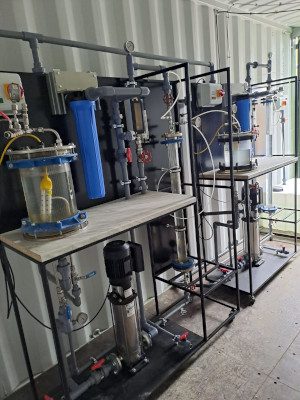
Testing has begun with a project that aims to reduce the environmental impact of ammonia emissions from livestock by using ammonia-harvesting technology, which was installed in July at a pig farm running initial trials.
The PigProGrAm scheme, backed by £600k of government money, has brought farming and engineering expertise together to demonstrate a solution for the harvesting of green ammonia from pig waste, with the possibility that this could be used in the generation of hydrogen.
The project combines the expertise of the Agriculture and Horticulture Development Board (AHDB), funding specialist Beta Technology, the University of Leeds, sustainable feed solutions firm Duynie Feed, a commercial pig unit in North Yorkshire, and Membracon, which specialises in water treatment, clean water recycling and effluent solutions.
Aman Sohl from Membracon said: “Our innovative Downflow Gas Contactor (DGC) is a patented, multiple award-winning technology that excels in a wide variety of gas separation applications, such as industrial carbon capture.”
He said the DGC will be used “to help generate a route for the livestock sector to become truly sustainable.” He suggested the project’s remit addressed “the true practices of a circular economy, while retaining a sound financial profile to continuing operations.”
Harvesting ammonia from pig waste means that ammonia emissions will be lower, while the gas itself could be used for producing a high-quality fertiliser or generating hydrogen.
Zanita Markham at AHDB hoped the project “will be the first stage of a larger demonstration.”
“The project is a step forwards in helping reduce the environmental impact of pig farms,” she said, adding that it “could have a significant positive impact on the public perception of pig farming.”
Agriculture is a major source of ammonia emissions which can impact negatively on biodiversity through nitrogen accumulation on land and acidification of water courses.
This project could be appled in multiple areas of pig farming operations, including feed.
The project is titled “PigProGrAm – Developing a Circular Economy for UK Pig Production Through Green Ammonia Harvesting” and it has received funding from the Government’s Farming Innovation Programme. The funding is delivered by Defra in partnership with UK Research & Innovation (UKRI).








